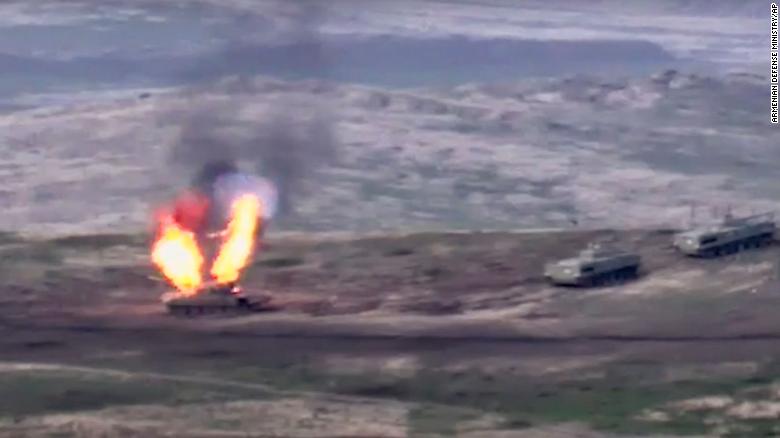Long-simmering tensions between Armenia and Azerbaijan appear to have flared up in the contested Nagorno-Karabakh region, with both sides accusing each other of attacking civilians.
The neighboring former Soviet republics have long been at odds over the territory — which is situated within the borders of Azerbaijan — and fought a war over it that finished in 1994.
Despite the conflict ending with a Russian-brokered ceasefire, military skirmishes between the two sides are not uncommon.
While Armenia said it was responding to missile attacks launched by its neighbor Sunday, Azerbaijan blamed Armenia for the clashes.
In response to the alleged firing of projectiles by Azerbaijan, Armenian Prime Minister Nikol Pashinyan tweeted that his country had “shot down 2 helicopters & 3 UAVs, destroyed 3 tanks.”
As a result of the escalating tensions, the Armenian government has decided to impose martial law and to order “general mobilization,” Pashinyan said in a later tweet.
Armenia earlier claimed that its neighbor had targeted civilians in peaceful areas, including in the region’s capital Stepanakert.
However, Azerbaijan suggested that Armenia was accountable for the latest flare-up between the two countries.
Hikmet Hajiyev, assistant of the President of the Republic of Azerbaijan and head of the Foreign Policy Affairs Department of the presidential administration, tweeted Sunday: “There are reports of dead and wounded among civilians and military servicemen. Extensive damage has been inflicted on many homes and civilian infrastructure.”
Accusing Armenia of “an act of aggression and use of force,” Hajiyev added that the “political-military leadership of Armenia bears full responsibility.”
“Currently, the Azerbaijan Army is taking retaliatory actions and our troops fully control the operational situation,” Azerbaijan’s Ministry of Defense said in a statement Sunday.
But Armenia’s Ministry of Foreign Affairs said in a statement: “We strongly condemn the aggression of the military-political leadership of Azerbaijan.”
“The military political leadership of Azerbaijan bears full responsibility for the consequences of their aggression,” the statement added.
Fighting between the two sides has been increasing in recent months.
In 2016, dozens of soldiers from both countries died during clashes. Two years earlier, then UN Secretary-General Ban Ki-moon urged Armenia and Azerbaijan to “commit themselves to immediate de-escalation and continuing dialogue” after reports of violence and casualties along the border.
The Nagorno-Karabakh region is internationally recognized as part of Azerbaijan but is governed by a majority group of ethnic Armenians.
>>>>



